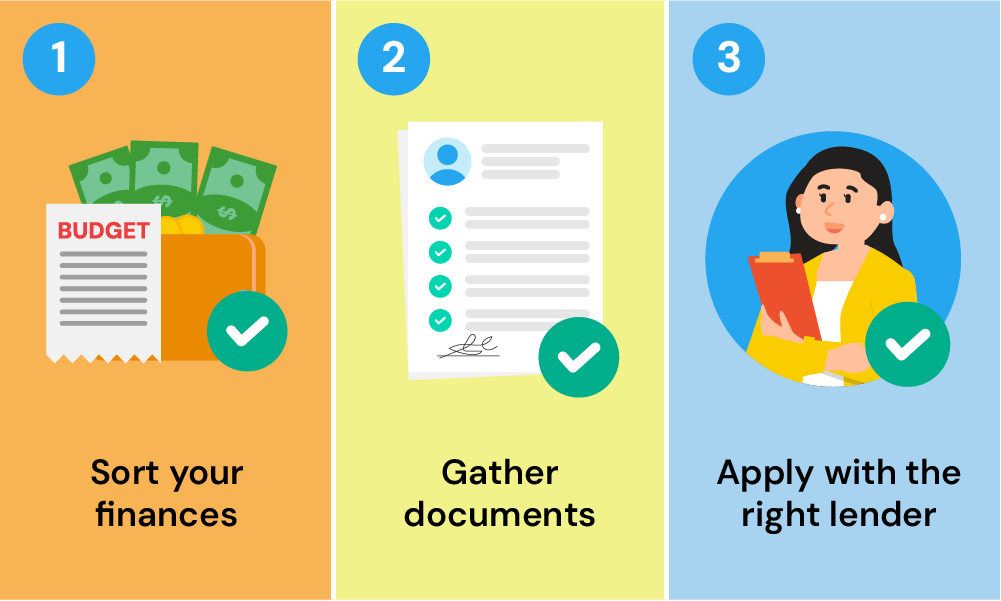- Can I Get A Mortgage On Maternity Leave?
- What Are The Benefits Of Getting A Mortgage On Maternity Leave?
- What Are The Challenges?
- How Much Can I Borrow On Maternity Leave?
- How To Get A Mortgage On Maternity Leave?
- How Much Should I Save for a Deposit?
- What If I’m Considering a Joint Application With a Partner?
- Can I Remortgage on Maternity Leave?
- Tips and Considerations For Success
- The Bottom Line
Getting a Mortgage on Maternity Leave: A Complete Guide

If you’re expecting a baby or have recently welcomed a new member into your family, the last thing you need is additional stress.
It might feel discouraging to find that getting a mortgage during maternity leave can be complex.
Luckily, this guide explains how to approach the mortgage application process while on maternity leave.
Ready?
Can I Get A Mortgage On Maternity Leave?
Yes, you can get a mortgage on maternity leave, but it requires careful planning and choosing the right lender.
It’s important to understand that lenders typically assess your affordability based on your income, and since your income is lower while on maternity leave, this can impact the amount you can borrow.
But, don’t be discouraged.
Many lenders are willing to consider your pre-leave salary for affordability assessments, allowing you to borrow based on your usual income rather than your temporary maternity pay. This approach makes getting a mortgage on maternity leave much more possible.

What Are The Benefits Of Getting A Mortgage On Maternity Leave?
There are several advantages to securing a mortgage while on maternity leave:
- Secure your dream home. Don’t let your temporary income dip delay your homeownership ambitions. By finding the right lender, you can secure your dream home despite receiving maternity pay.
- Lock in a favourable interest rate. Mortgage rates can fluctuate. Buying while on maternity leave allows you to potentially lock in a good interest rate before future increases, saving you money in the long run.
- Maintain momentum towards your goals. Waiting until after maternity leave to start the homebuying process can delay your timeline. Getting a mortgage during your leave ensures you continue moving towards your long-term homeownership goals without unnecessary delays.
What Are The Challenges?
While getting a mortgage on maternity leave is possible, there are a few challenges to be aware of
- Lenders may use your lower maternity pay. As mentioned, some lenders might base their affordability calculations solely on your maternity pay, reducing the amount you can borrow.
- Finding the right lender. Not all lenders offer policies that consider your full pre-leave salary. You’ll need to research and compare different lenders to find one that aligns with your situation.
- Additional paperwork and documentation. To convince lenders to use your full pre-leave salary, you’ll likely need additional documentation, such as a letter from your employer confirming your return to work date and salary upon returning.
Despite these challenges, with careful planning and the right lender, you can successfully navigate the process of getting a mortgage on maternity leave and achieve your dream of homeownership.
How Much Can I Borrow On Maternity Leave?
There’s no one-size-fits-all answer to this question.
The amount you can borrow depends largely on the lender you choose. Different lenders have different rules about how much you can borrow based on your income during this time.
Some lenders look at your full salary before maternity leave, while others only consider your reduced maternity pay. Some might even take an average of the two.
To get the best deal, find a lender that uses your full pre-leave salary and has fewer restrictions.
Lenders also use ‘income multiples’ to decide how much you can borrow, usually 4-5 times your annual income. But again, the income they use can vary when you’re on leave.
Beyond the lender’s policy, your borrowing potential also depends on factors like your existing credit history and the size of your deposit.
A bigger deposit usually means you can borrow more, regardless of the lender’s approach to maternity leave income.
Remember, applying to many lenders can hurt your credit score, so it’s vital to pick the right lender who offers favourable terms for considering your full salary from the get-go.

What If I am a Part-time Worker?
If you work part-time, whether before or during your maternity leave, lenders will usually assess your affordability based on your actual part-time income.
This means the borrowing amount you qualify for might be lower compared to someone working full-time.
How To Get A Mortgage On Maternity Leave?
Be organised and prepared!
Before starting your mortgage application, follow these steps:
1. Get Clear with Your Finances
This step helps you assess your affordability. Here’s what to do:
- Factor in childcare costs – Don’t underestimate the added expenses of childcare when creating your budget. Include these costs alongside other essentials like groceries and utilities.
- Consider potential income sources – Beyond your maternity pay, ask yourself: Do you have other income streams like savings, a partner’s salary, or investments? Include these potential sources in your financial picture.
- Determine a comfortable repayment amount – Don’t overstretch yourself. Estimate a monthly repayment amount you can comfortably manage even with your temporary income reduction.
2. Get Ready with the Paperwork
Before applying, collect these documents:
- 3–12 months of payslips as proof of income.
- A letter from your employer outlining your expected return date and salary post-maternity leave.
- 3-6 months of bank statements showing income and deposits.
- Proof of identification (passport or government ID).
- Proof of address (utility bills or official documents).
- Any documents that detail your outgoing expenses or credit reports should also be on hand.
Transparency is key.
Inform your lender about your pregnancy and maternity leave plans from the start. Honesty builds trust and allows them to accurately assess your situation.
3. Get the Right Lender
The right lender should be understanding of your situation. Ideally, they consider your full income before and after leave, as long as you have evidence.
Finding the right lender can be stressful, especially with a new baby on the way.
Consider this optional solution:
Consult a mortgage broker specialising in maternity leave. They understand the unique challenges and can guide you towards lenders with flexible income requirements.
Still unsure? Reach out to us. We’ll set up a free, no-obligation consultation with a top mortgage advisor who specialises in helping those on maternity leave.

How Much Should I Save for a Deposit?
You generally need to save at least 10% of the property’s value for a mortgage deposit. This minimum suits most traditional mortgages, though schemes like Help to Buy may accept less.
Saving a bigger deposit boosts your chances of mortgage approval on maternity leave income and often results in a better interest rate.
The bigger your deposit, the lower the risk for the lender, improving your terms. For example, a 50% loan-to-value (LTV) mortgage often comes with better conditions than a 95% LTV one.
Your credit history also affects how much you need to save. A poor credit score could mean lenders ask for a larger deposit to balance out the risk. So, the deposit you’ll need varies with your financial situation and the lender’s risk assessment.
What If I’m Considering a Joint Application With a Partner?
When applying for a mortgage with your partner and one is on maternity leave, lenders will look at your combined income to determine how much they’ll lend you, typically offering four to five times this amount.
You need to prove your income and confirm the partner on leave will return to work on the same terms.
For example, if both of you earn £30,000 each, making a combined income of £60,000, and you can show the maternity leave won’t change the returning partner’s salary, you could borrow between £240,000 and £300,000.
This calculation assumes your financial situation stays the same and the partner on leave goes back to their job with the same pay.
Can I Remortgage on Maternity Leave?
The good news is, that remortgaging while on maternity leave is possible with the right lender!
The key steps and considerations are similar to getting a new mortgage:
- Finding the right lender. Seek a lender with flexible policies towards income considerations during maternity leave. Look for those willing to base your affordability on your pre-leave salary if returning to work.
- Documentation and proof. Similar to a new application, gather essential documents like payslips, proof of income, and bank statements. Provide a confirmation letter from your employer about your return date and expected salary.
- Transparency and disclosure. Inform the lender about your maternity leave and return-to-work plans from the beginning. Transparency builds trust and allows them to accurately assess your situation.
- Impact of childcare costs. Factor in childcare costs into your affordability calculations when remortgaging. Ensure your remortgage payment remains manageable even with these added expenses.
- Professional guidance. Consulting a mortgage broker experienced with remortgaging and maternity leave can be invaluable. They can navigate the unique challenges and connect you with lenders aligned with your situation.
Remember, remortgaging can offer numerous benefits like lower interest rates or accessing equity for home improvements.
With careful planning and the help of a specialist, you can successfully remortgage during your maternity leave and achieve your desired financial goals.
Tips and Considerations For Success
Here are some key tips to boost your chances of securing a mortgage on maternity leave:
1. Improve your credit score
A strong credit score shows your financial responsibility and reliability to lenders. If possible, start working on improving your credit score well before you apply for a mortgage.
Get free copies of your report from these credit agencies – Experian, Equifax, and TransUnion.
Then, ensure that your file is correct and up-to-date. Otherwise, contact the agencies for correction.
2. Save for a bigger deposit
As mentioned earlier, a larger deposit strengthens your application and improves your chances of approval, especially with temporary maternity leave income. Prioritise saving as much as possible to increase your deposit size.
3. Be prepared for potential delays and stay organised
The application process might take longer due to additional documentation required and verification for lenders.
Stay organised, be patient, and keep clear communication with your mortgage broker and chosen lender.
4. Consider government schemes.
Explore government schemes like the Mortgage Guarantee Scheme or the Right to Buy depending on your eligibility and location.
These schemes can assist with deposits or offer discounted purchases, making homeownership more attainable.

The Bottom Line
In conclusion, finding the right lenders is important while on maternity leave.
Lenders have different policies on income assessment during this period, which can seriously impact the amount you can borrow. It is crucial to choose lenders who will consider your full salary before maternity leave to maximise your borrowing amount.
It’s highly advisable to consult a mortgage broker. They can guide you through negotiating with lenders, preparing documents, and finding those who consider full salary during maternity leave. An experienced broker can save you time, reduce stress, and even help you save money.
If you want to save time in your search for the right broker, get in touch with us. We will connect you with a reliable broker experienced in handling mortgage situations similar to yours.
Get Matched With Your Dream Mortgage Advisor...

Frequently asked questions
Do I need to tell the lender I'm pregnant or on maternity leave?
Yes, it’s crucial to be transparent with the lender about your current situation, including being pregnant or on maternity leave.
This helps them accurately assess your affordability and ensures a fair application process. Hiding this information can lead to delays or even rejection of your application.
What about paternity leave?
The same rules and considerations apply to both maternity and paternity leave. Be upfront with the lender if your partner is on leave, as it affects your household income and affordability potential.
Does bad credit affect my chances?
Having bad credit can make getting a mortgage on maternity leave more challenging, but it’s not impossible. The key is finding a lender and broker who understands your situation and is willing to consider your full pre-leave salary. Having a larger deposit and a clear plan for returning to work can also improve your chances.
Can I, as a self-employed person, get a mortgage on maternity leave?
Yes, self-employed individuals can secure mortgages on maternity leave. However, it requires extra planning and documentation.
Be prepared to showcase your business’s stability, your income history before leaving, and the potential impact of your leave on your income. Having a clear plan for managing your business during leave and returning to work is crucial.
This article has been fact checked
This article was created, checked, and verified by the expert team at Money Saving Guru. Trust us, you’re in good hands.




